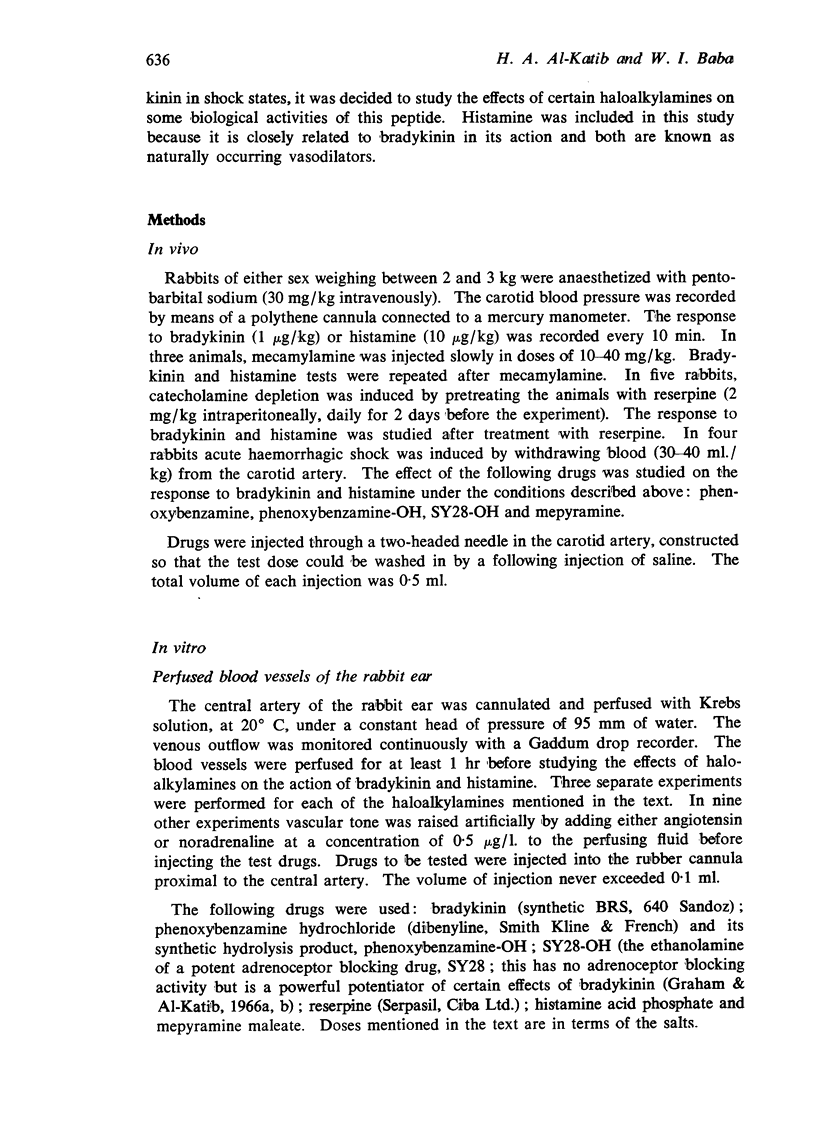Abstract
1. Bradykinin and histamine reduced the blood pressure in normotensive anaesthetized rabbits. They produced a pressor or biphasic response when the initial arterial pressure was lowered by acute haemorrhagic shock or mecamylamine blockade. When blood pressure was lowered by pretreatment with reserpine, bradykinin remained depressor and histamine produced a biphasic response.
2. Phenoxybenzamine abolished the pressor responses to bradykinin and histamine, but potentiated and prolonged the depressor response to bradykinin.
3. Phenoxybenzamine-OH and SY28-OH modified neither the pressor nor depressor responses to histamine, nor the pressor response to bradykinin. However, they greatly potentiated and prolonged the hypotensive effect of bradykinin.
4. In the isolated rabbit ear preparation, the initial vascular tone influenced the responses to bradykinin and histamine. In preparations having low vascular tone they were vasoconstrictors, but when the tone was raised by angiotensin or noradrenaline, they were vasodilators.
5. Phenoxybenzamine blocked the vasconstrictor effect of bradykinin in a rabbit ear preparation having low vascular tone and phenoxybenzamine or its related ethanolamine potentiated the vasodilator response to bradykinin in preparations in which the tone was high.
6. The significance of these findings is discussed.
Full text
PDF






Selected References
These references are in PubMed. This may not be the complete list of references from this article.
- FELDBERG W., LEWIS G. P. THE ACTION OF PEPTIDES ON THE ADRENAL MEDULLA. RELEASE OF ADRENALINE BY BRADYKININ AND ANGIOTENSIN. J Physiol. 1964 May;171:98–108. doi: 10.1113/jphysiol.1964.sp007364. [DOI] [PMC free article] [PubMed] [Google Scholar]
- Graham J. D., Al Katib H. The action of trypsin on blockade by 2-halogenoalkylamines: speculation on the nature of the alpha receptor for catecholamine. Br J Pharmacol Chemother. 1966 Oct;28(1):1–14. doi: 10.1111/j.1476-5381.1966.tb01868.x. [DOI] [PMC free article] [PubMed] [Google Scholar]
- Graham J. D., Katib H. A. The effect of 2-halogenoalkylamines on the biological activity of some peptides. Br J Pharmacol Chemother. 1966 Aug;27(2):377–386. doi: 10.1111/j.1476-5381.1966.tb01669.x. [DOI] [PMC free article] [PubMed] [Google Scholar]
- LILLEHEI R. C., LONGERBEAM J. K., BLOCH J. H., MANAX W. G. THE NATURE OF IRREVERSIBLE SHOCK: EXPERIMENTAL AND CLINICAL OBSERVATIONS. Ann Surg. 1964 Oct;160:682–710. doi: 10.1097/00000658-196410000-00012. [DOI] [PMC free article] [PubMed] [Google Scholar]
- Lang W. J., Pearson L. Studies on the pressor responses produced by bradykinin and kallidin. Br J Pharmacol Chemother. 1968 Feb;32(2):330–338. doi: 10.1111/j.1476-5381.1968.tb00976.x. [DOI] [PMC free article] [PubMed] [Google Scholar]
- Lewis G. P., Reit E. The action of angiotensin and bradykinin on the superior cervical ganglion of the cat. J Physiol. 1965 Aug;179(3):538–553. doi: 10.1113/jphysiol.1965.sp007679. [DOI] [PMC free article] [PubMed] [Google Scholar]
- MURPHY G. P., GAGNON J. A., EWALD R. A. RENAL AND SYSTEMIC HEMODYNAMIC EFFECTS OF DIBENZYLINE IN NORMOTENSION AND HEMORRHAGIC HYPOTENSION. Surgery. 1965 Jun;57:856–867. [PubMed] [Google Scholar]
- ROCHA E SILVA M., CORRADO A. P., RAMOS A. O. Potentiation of duration of the vasodilator effect of bradykinin by sympatholytic drugs and by reserpine. J Pharmacol Exp Ther. 1960 Mar;128:217–226. [PubMed] [Google Scholar]
- ROCHAESILVA M., LEME J. G. ANTAGONISTIS OF BRADYKININ. Med Exp Int J Exp Med. 1963;8:287–295. [PubMed] [Google Scholar]
- Rush B. F., Jr, Rosenberg J. C., Spencer F. C. Effect of dibenzyline treatment on cardiac dynamics and oxidative metabolism in hemorrhagic shock. Ann Surg. 1965 Dec;162(6):1013–1016. doi: 10.1097/00000658-196512000-00007. [DOI] [PMC free article] [PubMed] [Google Scholar]
- Wiegershausen B., Hennighausen G. Gefässkonstriktion durch synthetisches Bradykinin und ihre pharmakologische Beeinflussbarkeit. Experientia. 1966 Apr 15;22(4):234–235. doi: 10.1007/BF01900929. [DOI] [PubMed] [Google Scholar]


